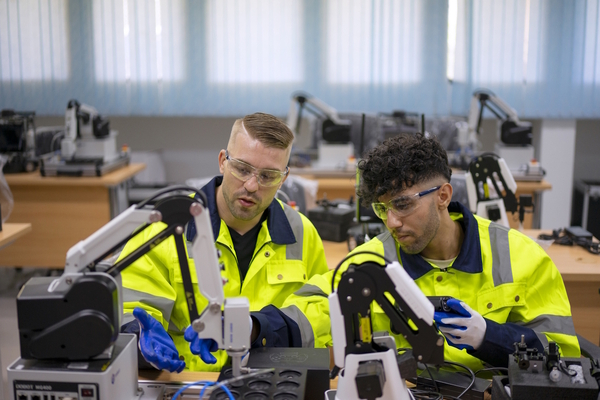The road to Private AI implementation

Joe Baguley at Broadcom explores how organisations can unlock the full potential of artificial intelligence
You’re reading this because you’re probably interested in the topic and curious about how to unlock the full potential of this technology for your organisation. But, before we get into the nuts and bolts, I would encourage you to read part one of this article series.
In that article, we explored private AI as a strategic approach for enterprises to harness Artificial Intelligence’s (AI) potential while maintaining robust security, data sovereignty, and regulatory compliance.
The global market for AI grew to 184 billion U.S. dollars in 2024, a considerable jump of nearly 50 billion compared to 2023 – and the growth trajectory is only set to get steeper in 2025. As discussed in my first piece, Private AI offers organisations a platform to intelligently and securely manage AI models, control data interactions, and future-proof their technological infrastructure.
By encouraging local data storage and so, supporting economic growth, and providing flexibility for evolving regulatory landscapes, Private AI empowers businesses to adopt cutting-edge AI technologies without compromising on privacy, choice, or control. On an organisational level, this could drive productivity gains, while also positioning the UK as a critical player in the AI ecosystem.
So now, how can organisations take the plunge and make the rapidly evolving landscape of Private AI work for them? Here are a few things to consider.
You don’t need to do a major tech overhaul
Customers consistently express uncertainty about AI adoption, primarily due to widespread misconceptions about the technological and financial barriers to entry. The prevailing narrative that AI implementation demands significant public cloud infrastructure has created unnecessary intimidation and hesitation among businesses looking to leverage advanced technologies.
Many have asked me: why should we make significant time and monetary investment in AI technologies hosted in the public cloud just to be told by a regulator or a cloud provider outside my country or region that I suddenly need to change tactics?
The simple answer: You don’t have to, and this is where Private AI comes into play. Private AI models are inherently adaptable, integrating global regulatory considerations directly into their core architecture. By maintaining granular data traceability, these models enable organisations to proactively comply with emerging data sovereignty requirements.
Unlike the hasty public cloud migrations of the past, where companies adopted technologies without strategic foresight, Private AI represents a more considered, cost-effective, mission-adaptable approach to technological infrastructure.
The AI landscape is dynamic and rapidly expanding, with new technology vendors constantly emerging. Private AI offers enterprises a flexible, modular infrastructure that prevents vendor lock-in and ensures ongoing compatibility with evolving technologies. Organisations can now build AI platforms designed to integrate smoothly with open source tools and APIs.
Additionally, product capabilities such as advanced resource scheduling and memory management allow for the dynamic allocation of GPU and hardware resources between production and research tasks, ensuring optimal performance while keeping costs in check. This flexibility allows businesses to expand their AI capabilities without having to invest in a lot of extra hardware.
Understand the use cases first
To understand how to use private AI tools for your organisation, look at the use cases around you first. Private AI is already transforming how organisations tackle data privacy and compliance challenges across multiple sectors.
In financial services for instance, banks are leveraging this technology to process sensitive information securely, enabling advanced fraud detection and customer analysis while adhering to strict regulatory standards. By keeping data out of public cloud environments, these institutions are able to get maximum value out of their data, while maintaining robust protection and operational efficiency.
Similarly, law enforcement agencies are using private AI to revolutionise investigative processes. Advanced language models help analyse vast volumes of case data, uncovering critical connections and accelerating case resolutions with unprecedented precision, all while ensuring strict control over sensitive information.
Customer contact centres represent another compelling use case, where private AI enhances backend operations to support human agents. Rather than replacing customer interactions, these AI systems enable faster, more accurate responses, improving ticket resolution rates and overall productivity while allowing for complete data privacy and compliance.
These practical applications demonstrate private AI’s transformative potential: delivering tangible business benefits like increased productivity, value, and cost efficiency, without sacrificing the fundamental need for data security and regulatory compliance.
Private AI represents more than a technological trend—it’s a fundamental reimagining of how businesses can better offer intelligent solutions. By seamlessly integrating robust regulatory compliance with dynamic innovation, this approach has become essential for enterprises navigating today’s complex digital landscape.
In an era where data privacy and technological adaptability are paramount, private AI is emerging as a transformative force, redefining the boundaries of innovation and progress. The opportunity is clear: embrace this approach, and witness firsthand how intelligent, secure AI can drive your organisation’s strategic capabilities.
Joe Baguley is EMEA CTO at Broadcom
Main image courtesy of iStockPhoto.com and gorodenkoff

Business Reporter Team
You may also like
Most Viewed
Winston House, 3rd Floor, Units 306-309, 2-4 Dollis Park, London, N3 1HF
23-29 Hendon Lane, London, N3 1RT
020 8349 4363
© 2024, Lyonsdown Limited. Business Reporter® is a registered trademark of Lyonsdown Ltd. VAT registration number: 830519543





